Middle English Historical background • Appearing


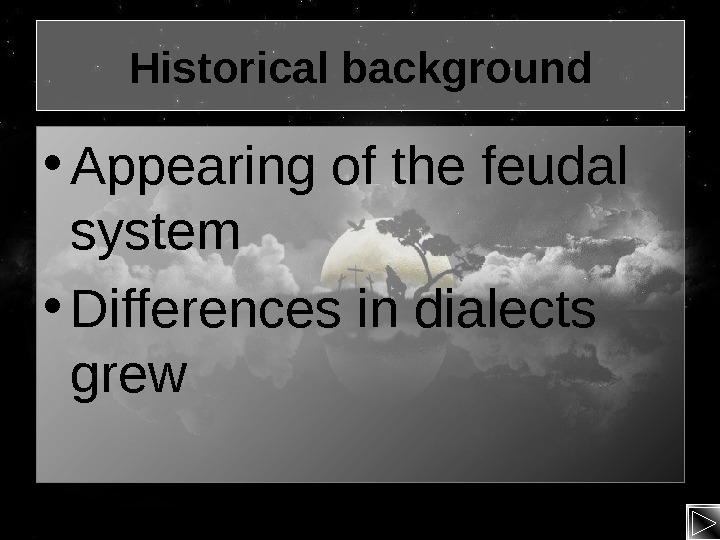
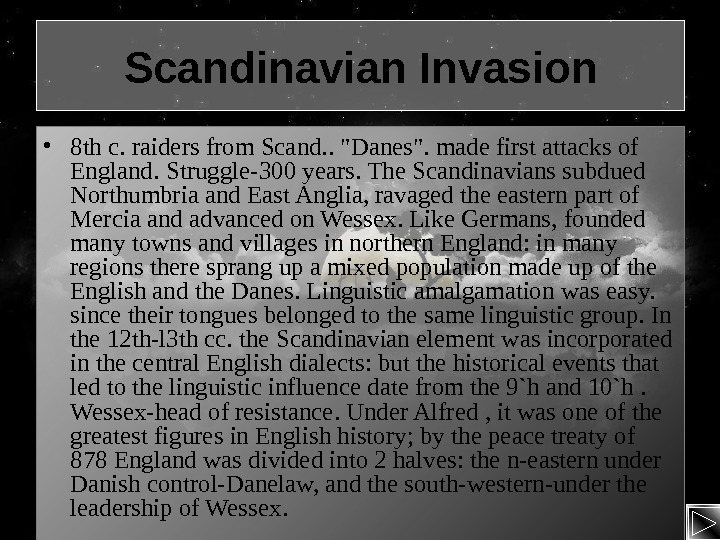
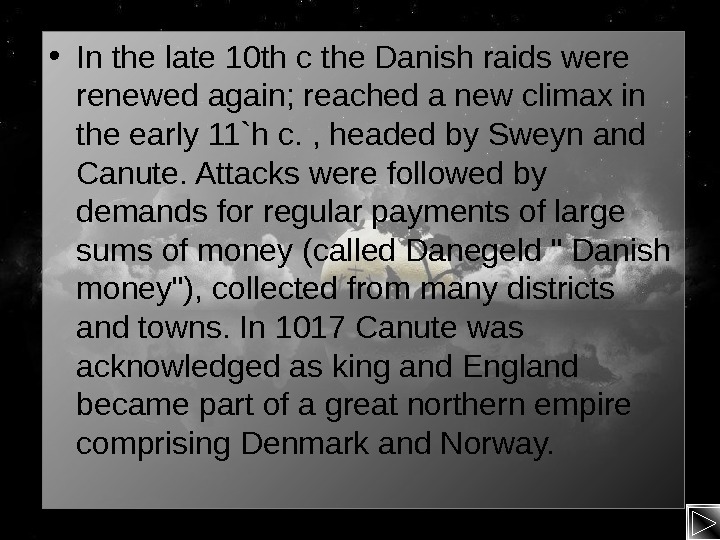
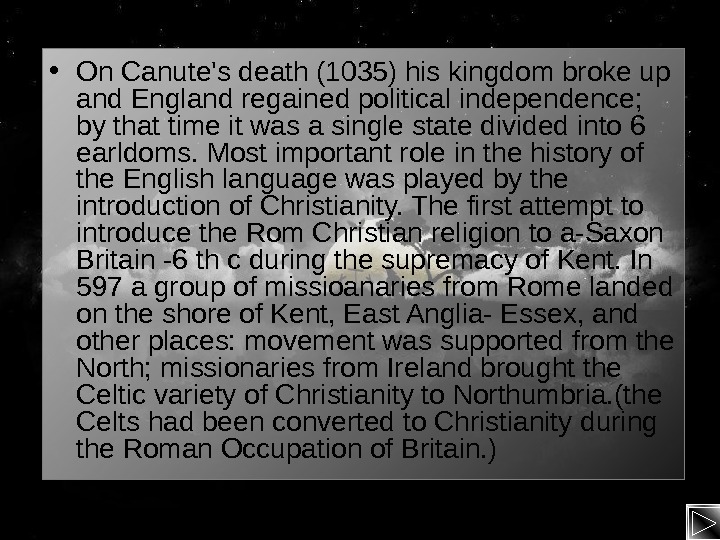
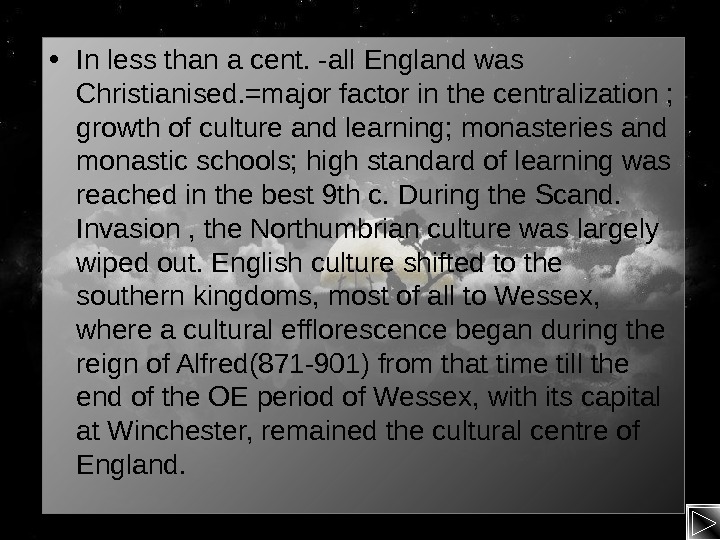
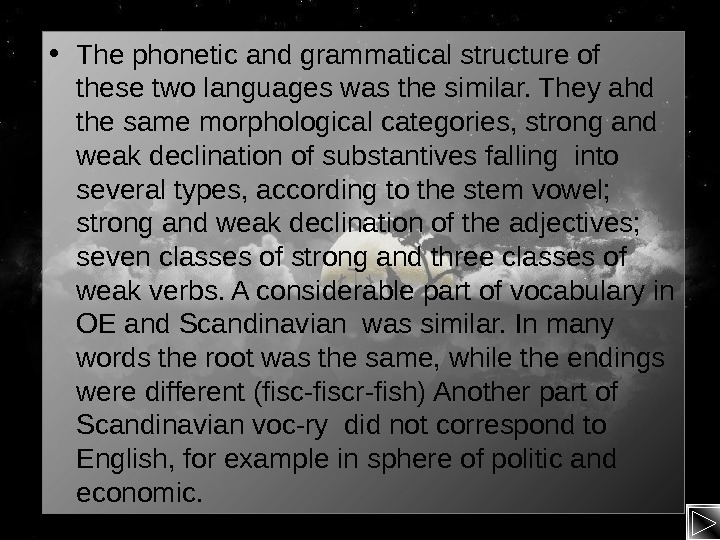
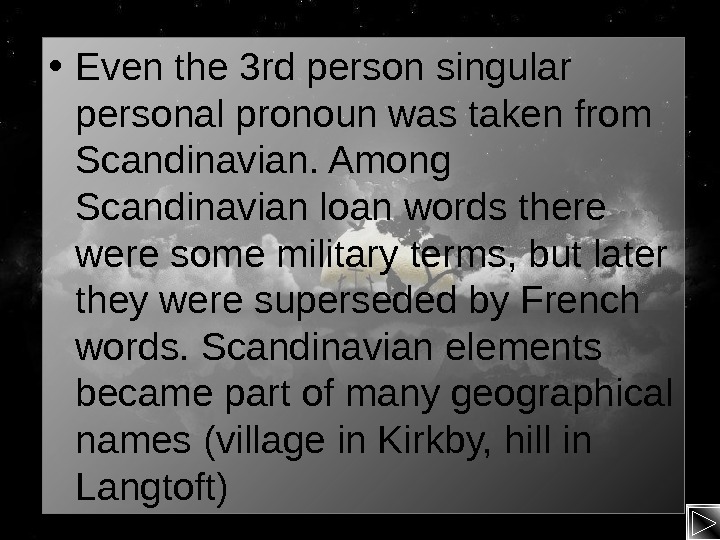
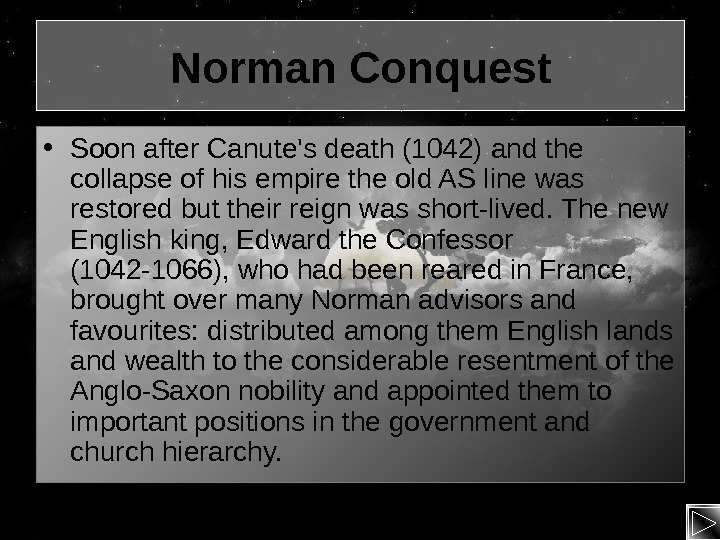
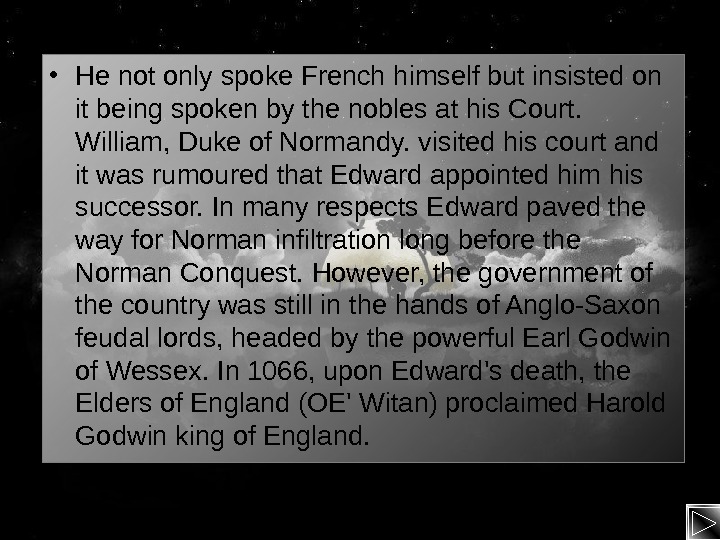
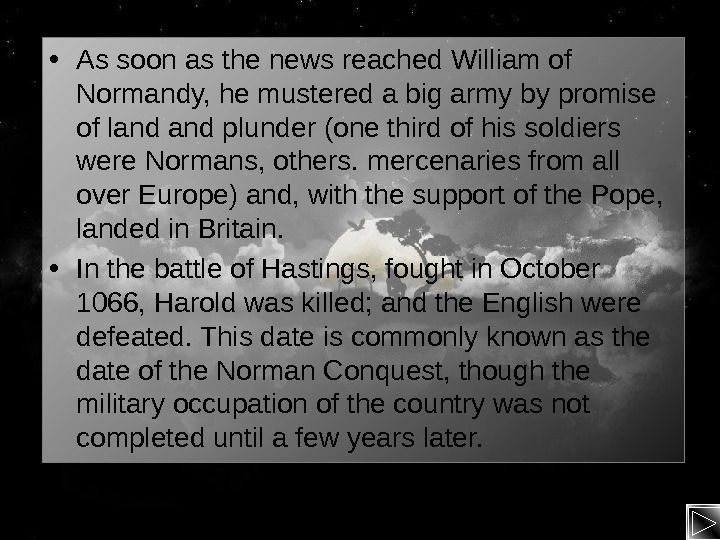

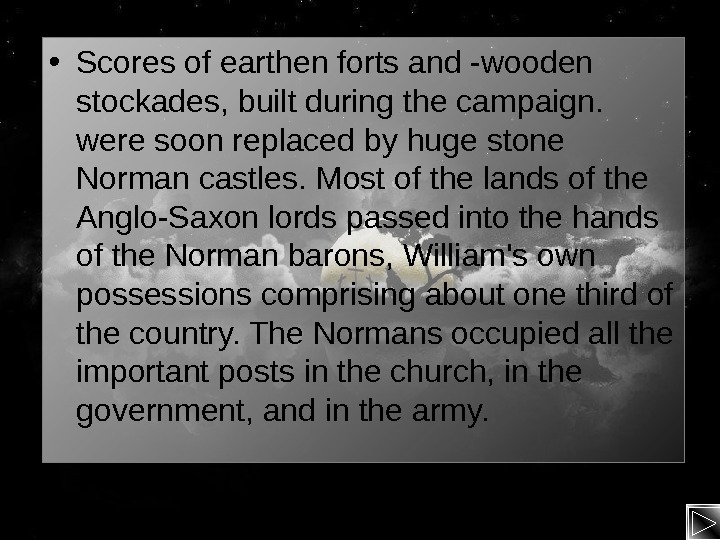
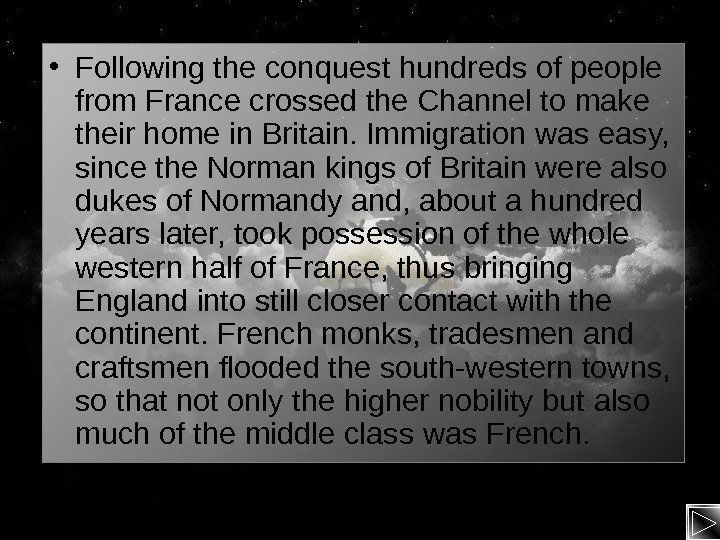
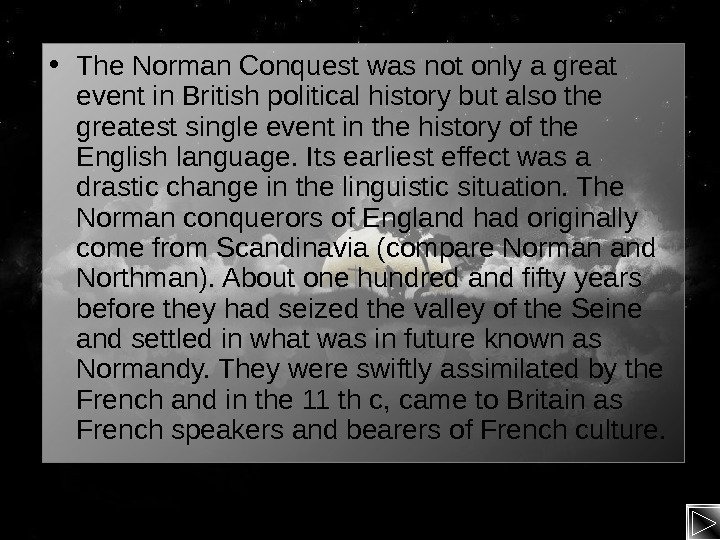
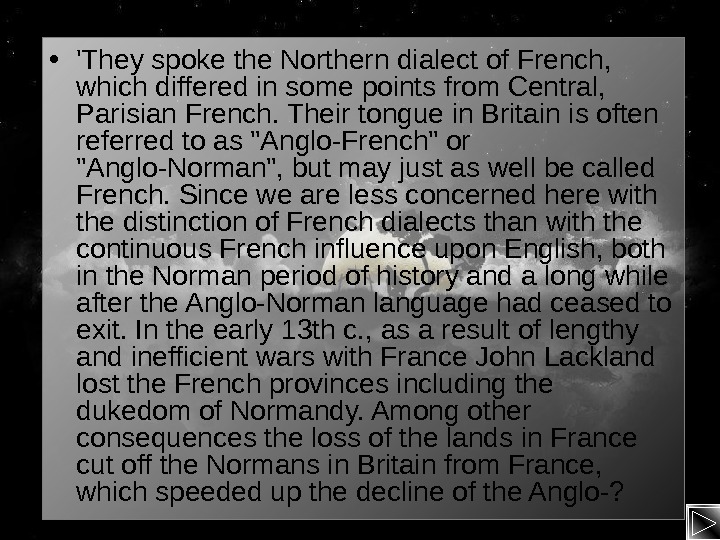



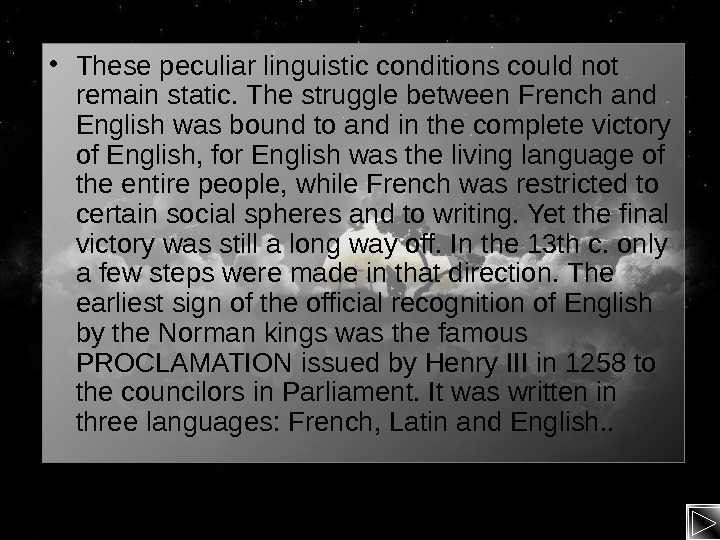
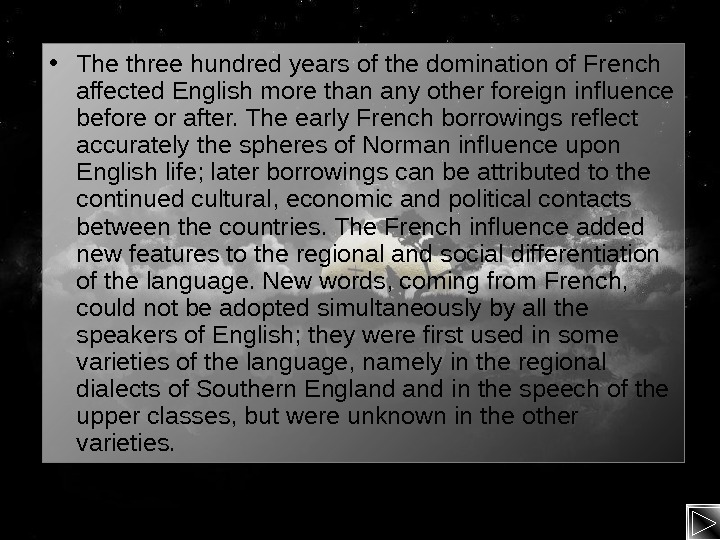

- Размер: 122 Кб
- Количество слайдов: 22
Описание презентации Middle English Historical background • Appearing по слайдам
 Middle English
Middle English
 Historical background • Appearing of the feudal system • Differences in dialects grew
Historical background • Appearing of the feudal system • Differences in dialects grew
 Scandinavian Invasion • 8 th c. raiders from Scand. . «Danes». made first attacks of England. Struggle-300 years. The Scandinavians subdued Northumbria and East Anglia, ravaged the eastern part of Mercia and advanced on Wessex. Like Germans, founded many towns and villages in northern England: in many regions there sprang up a mixed population made up of the English and the Danes. Linguistic amalgamation was easy. since their tongues belonged to the same linguistic group. In the 12 th-l 3 th cc. the Scandinavian element was incorporated in the central English dialects: but the historical events that led to the linguistic influence date from the 9`h and 10`h. Wessex-head of resistance. Under Alfred , it was one of the greatest figures in English history; by the peace treaty of 878 England was divided into 2 halves: the n-eastern under Danish control-Danelaw, and the south-western-under the leadership of Wessex.
Scandinavian Invasion • 8 th c. raiders from Scand. . «Danes». made first attacks of England. Struggle-300 years. The Scandinavians subdued Northumbria and East Anglia, ravaged the eastern part of Mercia and advanced on Wessex. Like Germans, founded many towns and villages in northern England: in many regions there sprang up a mixed population made up of the English and the Danes. Linguistic amalgamation was easy. since their tongues belonged to the same linguistic group. In the 12 th-l 3 th cc. the Scandinavian element was incorporated in the central English dialects: but the historical events that led to the linguistic influence date from the 9`h and 10`h. Wessex-head of resistance. Under Alfred , it was one of the greatest figures in English history; by the peace treaty of 878 England was divided into 2 halves: the n-eastern under Danish control-Danelaw, and the south-western-under the leadership of Wessex.
 • In the late 10 th c the Danish raids were renewed again; reached a new climax in the early 11`h c. , headed by Sweyn and Canute. Attacks were followed by demands for regular payments of large sums of money (called Danegeld » Danish money»), collected from many districts and towns. In 1017 Canute was acknowledged as king and England became part of a great northern empire comprising Denmark and Norway.
• In the late 10 th c the Danish raids were renewed again; reached a new climax in the early 11`h c. , headed by Sweyn and Canute. Attacks were followed by demands for regular payments of large sums of money (called Danegeld » Danish money»), collected from many districts and towns. In 1017 Canute was acknowledged as king and England became part of a great northern empire comprising Denmark and Norway.
 • On Canute’s death (1035) his kingdom broke up and England regained political independence; by that time it was a single state divided into 6 earldoms. Most important role in the history of the English language was played by the introduction of Christianity. The first attempt to introduce the Rom Christian religion to a-Saxon Britain -6 th c during the supremacy of Kent. In 597 a group of missioanaries from Rome landed on the shore of Kent, East Anglia- Essex, and other places: movement was supported from the North; missionaries from Ireland brought the Celtic variety of Christianity to Northumbria. (the Celts had been converted to Christianity during the Roman Occupation of Britain. )
• On Canute’s death (1035) his kingdom broke up and England regained political independence; by that time it was a single state divided into 6 earldoms. Most important role in the history of the English language was played by the introduction of Christianity. The first attempt to introduce the Rom Christian religion to a-Saxon Britain -6 th c during the supremacy of Kent. In 597 a group of missioanaries from Rome landed on the shore of Kent, East Anglia- Essex, and other places: movement was supported from the North; missionaries from Ireland brought the Celtic variety of Christianity to Northumbria. (the Celts had been converted to Christianity during the Roman Occupation of Britain. )
 • In less than a cent. -all England was Christianised. =major factor in the centralization ; growth of culture and learning; monasteries and monastic schools; high standard of learning was reached in the best 9 th c. During the Scand. Invasion , the Northumbrian culture was largely wiped out. English culture shifted to the southern kingdoms, most of all to Wessex, where a cultural efflorescence began during the reign of Alfred(871 -901) from that time till the end of the OE period of Wessex, with its capital at Winchester, remained the cultural centre of England.
• In less than a cent. -all England was Christianised. =major factor in the centralization ; growth of culture and learning; monasteries and monastic schools; high standard of learning was reached in the best 9 th c. During the Scand. Invasion , the Northumbrian culture was largely wiped out. English culture shifted to the southern kingdoms, most of all to Wessex, where a cultural efflorescence began during the reign of Alfred(871 -901) from that time till the end of the OE period of Wessex, with its capital at Winchester, remained the cultural centre of England.
 • The phonetic and grammatical structure of these two languages was the similar. They ahd the same morphological categories, strong and weak declination of substantives falling into several types, according to the stem vowel; strong and weak declination of the adjectives; seven classes of strong and three classes of weak verbs. A considerable part of vocabulary in OE and Scandinavian was similar. In many words the root was the same, while the endings were different (fisc-fiscr-fish) Another part of Scandinavian voc-ry did not correspond to English, for example in sphere of politic and economic.
• The phonetic and grammatical structure of these two languages was the similar. They ahd the same morphological categories, strong and weak declination of substantives falling into several types, according to the stem vowel; strong and weak declination of the adjectives; seven classes of strong and three classes of weak verbs. A considerable part of vocabulary in OE and Scandinavian was similar. In many words the root was the same, while the endings were different (fisc-fiscr-fish) Another part of Scandinavian voc-ry did not correspond to English, for example in sphere of politic and economic.
 • Even the 3 rd person singular personal pronoun was taken from Scandinavian. Among Scandinavian loan words there were some military terms, but later they were superseded by French words. Scandinavian elements became part of many geographical names (village in Kirkby, hill in Langtoft)
• Even the 3 rd person singular personal pronoun was taken from Scandinavian. Among Scandinavian loan words there were some military terms, but later they were superseded by French words. Scandinavian elements became part of many geographical names (village in Kirkby, hill in Langtoft)
 Norman Conquest • Soon after Canute’s death (1042) and the collapse of his empire the old AS line was restored but their reign was short-lived. The new English king, Edward the Confessor (1042 -1066), who had been reared in France, brought over many Norman advisors and favourites: distributed among them English lands and wealth to the considerable resentment of the Anglo-Saxon nobility and appointed them to important positions in the government and church hierarchy.
Norman Conquest • Soon after Canute’s death (1042) and the collapse of his empire the old AS line was restored but their reign was short-lived. The new English king, Edward the Confessor (1042 -1066), who had been reared in France, brought over many Norman advisors and favourites: distributed among them English lands and wealth to the considerable resentment of the Anglo-Saxon nobility and appointed them to important positions in the government and church hierarchy.
 • He not only spoke French himself but insisted on it being spoken by the nobles at his Court. William, Duke of Normandy. visited his court and it was rumoured that Edward appointed him his successor. In many respects Edward paved the way for Norman infiltration long before the Norman Conquest. However, the government of the country was still in the hands of Anglo-Saxon feudal lords, headed by the powerful Earl Godwin of Wessex. In 1066, upon Edward’s death, the Elders of England (OE’ Witan) proclaimed Harold Godwin king of England.
• He not only spoke French himself but insisted on it being spoken by the nobles at his Court. William, Duke of Normandy. visited his court and it was rumoured that Edward appointed him his successor. In many respects Edward paved the way for Norman infiltration long before the Norman Conquest. However, the government of the country was still in the hands of Anglo-Saxon feudal lords, headed by the powerful Earl Godwin of Wessex. In 1066, upon Edward’s death, the Elders of England (OE’ Witan) proclaimed Harold Godwin king of England.
 • As soon as the news reached William of Normandy, he mustered a big army by promise of land plunder (one third of his soldiers were Normans, others. mercenaries from all over Europe) and, with the support of the Pope, landed in Britain. • In the battle of Hastings, fought in October 1066, Harold was killed; and the English were defeated. This date is commonly known as the date of the Norman Conquest, though the military occupation of the country was not completed until a few years later.
• As soon as the news reached William of Normandy, he mustered a big army by promise of land plunder (one third of his soldiers were Normans, others. mercenaries from all over Europe) and, with the support of the Pope, landed in Britain. • In the battle of Hastings, fought in October 1066, Harold was killed; and the English were defeated. This date is commonly known as the date of the Norman Conquest, though the military occupation of the country was not completed until a few years later.
 • After the victory at Hastings, William by-passed London cutting it off from the North and made the Witan of London and the bishops at Westminster Abbey crown him king. William and his barons laid waste many lands in England, burning down villages and estates. They conducted a relentless campaign of subjugation, devastated and almost depopulated Northumbria and Mercia, which tried to rise against the conquerors.
• After the victory at Hastings, William by-passed London cutting it off from the North and made the Witan of London and the bishops at Westminster Abbey crown him king. William and his barons laid waste many lands in England, burning down villages and estates. They conducted a relentless campaign of subjugation, devastated and almost depopulated Northumbria and Mercia, which tried to rise against the conquerors.
 • Scores of earthen forts and -wooden stockades, built during the campaign. were soon replaced by huge stone Norman castles. Most of the lands of the Anglo-Saxon lords passed into the hands of the Norman barons, William’s own possessions comprising about one third of the country. The Normans occupied all the important posts in the church, in the government, and in the army.
• Scores of earthen forts and -wooden stockades, built during the campaign. were soon replaced by huge stone Norman castles. Most of the lands of the Anglo-Saxon lords passed into the hands of the Norman barons, William’s own possessions comprising about one third of the country. The Normans occupied all the important posts in the church, in the government, and in the army.
 • Following the conquest hundreds of people from France crossed the Channel to make their home in Britain. Immigration was easy, since the Norman kings of Britain were also dukes of Normandy and, about a hundred years later, took possession of the whole western half of France, thus bringing England into still closer contact with the continent. French monks, tradesmen and craftsmen flooded the south-western towns, so that not only the higher nobility but also much of the middle class was French.
• Following the conquest hundreds of people from France crossed the Channel to make their home in Britain. Immigration was easy, since the Norman kings of Britain were also dukes of Normandy and, about a hundred years later, took possession of the whole western half of France, thus bringing England into still closer contact with the continent. French monks, tradesmen and craftsmen flooded the south-western towns, so that not only the higher nobility but also much of the middle class was French.
 • The Norman Conquest was not only a great event in British political history but also the greatest single event in the history of the English language. Its earliest effect was a drastic change in the linguistic situation. The Norman conquerors of England had originally come from Scandinavia (compare Norman and Northman). About one hundred and fifty years before they had seized the valley of the Seine and settled in what was in future known as Normandy. They were swiftly assimilated by the French and in the 11 th c, came to Britain as French speakers and bearers of French culture.
• The Norman Conquest was not only a great event in British political history but also the greatest single event in the history of the English language. Its earliest effect was a drastic change in the linguistic situation. The Norman conquerors of England had originally come from Scandinavia (compare Norman and Northman). About one hundred and fifty years before they had seized the valley of the Seine and settled in what was in future known as Normandy. They were swiftly assimilated by the French and in the 11 th c, came to Britain as French speakers and bearers of French culture.
 • ‘They spoke the Northern dialect of French, which differed in some points from Central, Parisian French. Their tongue in Britain is often referred to as «Anglo-French» or «Anglo-Norman», but may just as well be called French. Since we are less concerned here with the distinction of French dialects than with the continuous French influence upon English, both in the Norman period of history and a long while after the Anglo-Norman language had ceased to exit. In the early 13 th c. , as a result of lengthy and inefficient wars with France John Lackland lost the French provinces including the dukedom of Normandy. Among other consequences the loss of the lands in France cut off the Normans in Britain from France, which speeded up the decline of the Anglo-?
• ‘They spoke the Northern dialect of French, which differed in some points from Central, Parisian French. Their tongue in Britain is often referred to as «Anglo-French» or «Anglo-Norman», but may just as well be called French. Since we are less concerned here with the distinction of French dialects than with the continuous French influence upon English, both in the Norman period of history and a long while after the Anglo-Norman language had ceased to exit. In the early 13 th c. , as a result of lengthy and inefficient wars with France John Lackland lost the French provinces including the dukedom of Normandy. Among other consequences the loss of the lands in France cut off the Normans in Britain from France, which speeded up the decline of the Anglo-?
 • The most immediate consequence of the Norman domination in Britain is to be seen in the wide use of the French language in many spheres of life. For almost three hundred years French was the official language of administration: it was the language of the king’s court, the law courts, the church, the army and the castle. It was also the every day language of many nobles, of the higher clergy and of many townspeople in the South. The intellectual life, literature and education were in the hands of French-speaking people; French; alongside Latin, was the language of writing.
• The most immediate consequence of the Norman domination in Britain is to be seen in the wide use of the French language in many spheres of life. For almost three hundred years French was the official language of administration: it was the language of the king’s court, the law courts, the church, the army and the castle. It was also the every day language of many nobles, of the higher clergy and of many townspeople in the South. The intellectual life, literature and education were in the hands of French-speaking people; French; alongside Latin, was the language of writing.
 • Teaching was largely conducted in French and boys at school were taught to translate their Latin into French instead of English. • For all that, England never stopped being an English-speaking country. The bulk of the population held fast to their, own tongue: the lower classes in the towns, and especially, in the country-side, those who lived in the Midlands and up north, continued to speak English and looked upon French as foreign and hostile. Since most of the people were illiterate, the English language was almost exclusively used for spoken communication. • At first the two languages existed side by side without mingling.
• Teaching was largely conducted in French and boys at school were taught to translate their Latin into French instead of English. • For all that, England never stopped being an English-speaking country. The bulk of the population held fast to their, own tongue: the lower classes in the towns, and especially, in the country-side, those who lived in the Midlands and up north, continued to speak English and looked upon French as foreign and hostile. Since most of the people were illiterate, the English language was almost exclusively used for spoken communication. • At first the two languages existed side by side without mingling.
 • Then, slowly and quietly, they began to permeate each other. The Norman barons and the French town-dwellers had to pick up English words to make themselves understood, while the English began to use French words in current speech. A good knowledge of French would mark a person of higher standing giving him a certain social prestige. Probably many people became bilingual and had a fair command of both languages,
• Then, slowly and quietly, they began to permeate each other. The Norman barons and the French town-dwellers had to pick up English words to make themselves understood, while the English began to use French words in current speech. A good knowledge of French would mark a person of higher standing giving him a certain social prestige. Probably many people became bilingual and had a fair command of both languages,
 • These peculiar linguistic conditions could not remain static. The struggle between French and English was bound to and in the complete victory of English, for English was the living language of the entire people, while French was restricted to certain social spheres and to writing. Yet the final victory was still a long way off. In the 13 th c. only a few steps were made in that direction. The earliest sign of the official recognition of English by the Norman kings was the famous PROCLAMATION issued by Henry III in 1258 to the councilors in Parliament. It was written in three languages: French, Latin and English. .
• These peculiar linguistic conditions could not remain static. The struggle between French and English was bound to and in the complete victory of English, for English was the living language of the entire people, while French was restricted to certain social spheres and to writing. Yet the final victory was still a long way off. In the 13 th c. only a few steps were made in that direction. The earliest sign of the official recognition of English by the Norman kings was the famous PROCLAMATION issued by Henry III in 1258 to the councilors in Parliament. It was written in three languages: French, Latin and English. .
 • The three hundred years of the domination of French affected English more than any other foreign influence before or after. The early French borrowings reflect accurately the spheres of Norman influence upon English life; later borrowings can be attributed to the continued cultural, economic and political contacts between the countries. The French influence added new features to the regional and social differentiation of the language. New words, coming from French, could not be adopted simultaneously by all the speakers of English; they were first used in some varieties of the language, namely in the regional dialects of Southern England in the speech of the upper classes, but were unknown in the other varieties.
• The three hundred years of the domination of French affected English more than any other foreign influence before or after. The early French borrowings reflect accurately the spheres of Norman influence upon English life; later borrowings can be attributed to the continued cultural, economic and political contacts between the countries. The French influence added new features to the regional and social differentiation of the language. New words, coming from French, could not be adopted simultaneously by all the speakers of English; they were first used in some varieties of the language, namely in the regional dialects of Southern England in the speech of the upper classes, but were unknown in the other varieties.
 • This led to growing dialectal differences, regional and social. Later the new features adopted from French extended to other varieties of the language. The use of a foreign tongue as the state language, the diversity of the dialects and the decline of the written form of English created a situation extremely favorable for increased variation and for more intensive linguistic change
• This led to growing dialectal differences, regional and social. Later the new features adopted from French extended to other varieties of the language. The use of a foreign tongue as the state language, the diversity of the dialects and the decline of the written form of English created a situation extremely favorable for increased variation and for more intensive linguistic change

